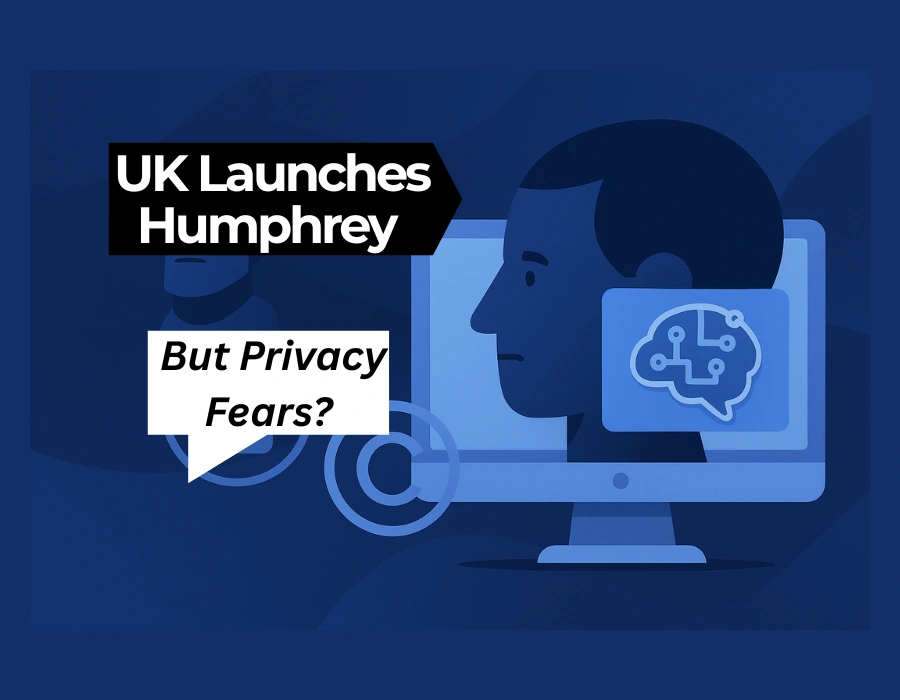In a move that could reshape how government work gets done, the UK has officially launched “Humphrey” — a comprehensive suite of artificial intelligence tools designed to support civil servants across England and Wales. Developed internally by the Department for Science, Innovation and Technology (DSIT), the toolkit taps into some of the most powerful AI models on the planet, including OpenAI’s GPT, Anthropic’s Claude, and Google’s Gemini.
But while the government hails it as a leap forward in public service efficiency, not everyone is on board. Concerns around data privacy, intellectual property rights, and ethical oversight are growing louder by the day.
What Humphrey does?
Humphrey isn’t just one tool — it’s a growing family of AI-powered applications that aim to streamline the often time-consuming and repetitive tasks civil servants face daily. Named cheekily after Sir Humphrey Appleby, the fictional bureaucrat from the classic political satire Yes, Minister, the suite includes tools for meeting transcription, consultation analysis, legal drafting, and policy writing.
Some standout components include:
- Consult: Designed to analyze thousands of public consultation submissions in minutes. Previously, this could take weeks of manual labour. During pilot runs, it delivered results that rivalled human reviewers — boasting a strong F1 score of 0.76.
- Minute: An AI assistant that records and summarizes meetings. Tested in 25 local councils, including West Berkshire and Stockton-on-Tees, it reportedly saves up to an hour of admin work for every hour of meeting.
- Lex, Redbox, and Parlex: Tools focused on summarizing legal content, drafting policy documents, and generating government briefings.
Why the government is betting big?
According to DSIT, the AI toolkit isn’t just saving time — it’s saving serious taxpayer money. Public consultations, for instance, consume around 75,000 staff days annually across government departments. Early estimates suggest that Humphrey could help save up to £20 million a year by automating large parts of this process.
The government is also launching a nationwide AI training initiative for civil servants. Dubbed “One Big Thing,” the program will begin this autumn and aims to train over 400,000 civil servants in using AI tools like Humphrey efficiently and ethically.
“This is about freeing people up to focus on judgement, empathy, and serving the public,” said Peter Kyle, the UK’s Technology Secretary. “It’s not about replacing people — it’s about giving them better tools.”
Concerns around IP, bias, and governance
Despite the hype, critics are deeply uneasy:
Copyright & licensing
Humphrey taps major LLMs via pay-as-you-go cloud use—without blanket licensing—drawing concern that creative works are fueling government AI without fair compensation.
Celebrity names like Elton John, Paul McCartney, Kate Bush, and Tom Stoppard have joined campaigns urging stronger copyright protections.
Accuracy & bias
Civil liberties advocate Shami Chakrabarti warns of “hallucinations” in AI—mistakes that could echo injustices like the Horizon scandal.
Professor Michael Rovatsos (Edinburgh) cautions that even with human oversight, biases can slip through unless watchdogs and audits follow every step.
Oversight & transparency
Critics like Ed Newton‑Rex of Fairly Trained argue it’s a conflict to regulate AI while using it internally. They want clear audits, error logs, and governance transparency.
Peers like Lord Chris Holmes and Lord Tim Clement‑Jones call for stronger algorithmic transparency standards and legal guardrails—beyond just the Bletchley Declaration.
Who’s Watching the AI Watching Us?
Transparency is another hot topic. Critics are asking: if the government is both developing and using these tools, who’s keeping them in check?
Ed Newton-Rex, founder of AI fairness group Fairly Trained, warned of a potential conflict of interest. “You can’t be both the referee and the player,” he said, calling for clear audits, public logs of AI use, and more independent scrutiny.
In response, the government says Humphrey comes with built-in safeguards, including:
- Human oversight on every AI decision.
- Evaluation tools to monitor and correct errors.
- An AI Playbook to guide ethical, responsible use.
- A new Digital Commercial Centre of Excellence to ensure fair procurement and reduce reliance on Big Tech.
There’s also talk of introducing an AI register — a public-facing log of which tools are used, where, and for what.
Conclusion
Humphrey is still in its early days, but it’s clear the UK government is committed to weaving AI into the fabric of public service. And while ministers are optimistic about the toolkit’s potential, the pressure is on to get governance and ethics right.
If successful, Humphrey could set a new global benchmark for how governments can use AI to improve internal efficiency — without compromising public trust. But it will take more than just powerful tools. It’ll require ongoing transparency, licensing clarity, strong regulation, and a commitment to using AI as a co-pilot, not a replacement.
The big question now? Whether the government can strike that delicate balance — and convince the public that Humphrey serves them, not just the system.
